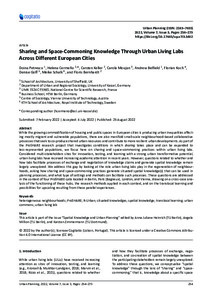| dc.date.accessioned | 2022-10-26T13:36:19Z | |
| dc.date.available | 2022-10-26T13:36:19Z | |
| dc.date.issued | 2022-08-25 | |
| dc.identifier | doi:10.17170/kobra-202210267038 | |
| dc.identifier.uri | http://hdl.handle.net/123456789/14217 | |
| dc.description.sponsorship | Gefördert durch den Publikationsfonds der Universität Kassel | ger |
| dc.language.iso | eng | |
| dc.rights | Namensnennung 4.0 International | * |
| dc.rights.uri | http://creativecommons.org/licenses/by/4.0/ | * |
| dc.subject | heterogeneous neighbourhoods | eng |
| dc.subject | ProSHARE | eng |
| dc.subject | R-Urban | eng |
| dc.subject | situated knowledges | eng |
| dc.subject | spatial knowledge | eng |
| dc.subject | translocal learning | eng |
| dc.subject | urban commons | eng |
| dc.subject | urban living lab | eng |
| dc.subject.ddc | 300 | |
| dc.subject.ddc | 720 | |
| dc.title | Sharing and Space‐Commoning Knowledge Through Urban Living Labs Across Different European Cities | eng |
| dc.type | Aufsatz | |
| dcterms.abstract | While the growing commodification of housing and public spaces in European cities is producing urban inequalities affecting mostly migrant and vulnerable populations, there are also manifold small-scale neighbourhood-based collaborative processes that seek to co-produce shared urban resources and contribute to more resilient urban developments. As part of the ProSHARE research project that investigates conditions in which sharing takes place and can be expanded to less-represented populations, we focus here on sharing and space-commoning practices within urban living labs. Considered multi-stakeholders sites for innovation, testing, and learning with a strong urban transformative potential, urban living labs have received increasing academic attention in recent years. However, questions related to whether and how labs facilitate processes of exchange and negotiation of knowledge claims and generate spatial knowledge remain largely unexplored. We address this gap by looking at the role urban living labs play in the regeneration of neighbourhoods, asking how sharing and space-commoning practices generate situated spatial knowledge(s) that can be used in planning processes, and what type of settings and methods can facilitate such processes. These questions are addressed in the context of four ProSHARE-Labs located in Berlin, Paris (Bagneux), London, and Vienna, drawing on a cross-case analysis of the functioning of these hubs, the research methods applied in each context, and on the translocal learning and possibilities for upscaling resulting from these parallel experiences. | eng |
| dcterms.accessRights | open access | |
| dcterms.creator | Petrescu, Doina | |
| dcterms.creator | Cermeño, Helena | |
| dcterms.creator | Keller, Carsten | |
| dcterms.creator | Moujan, Carola | |
| dcterms.creator | Belfield, Andrew | |
| dcterms.creator | Koch, Florian | |
| dcterms.creator | Goff, Denise | |
| dcterms.creator | Schalk, Meike | |
| dcterms.creator | Bernhardt, Floris | |
| dc.relation.doi | doi:10.17645/up.v7i3.5402 | |
| dc.subject.swd | Europa | ger |
| dc.subject.swd | Räumliches Wissen | ger |
| dc.subject.swd | Erkenntnistheorie | ger |
| dc.subject.swd | Gemeinwohl | ger |
| dc.subject.swd | Stadtentwicklung | ger |
| dc.subject.swd | Stadtplanung | ger |
| dc.subject.swd | Gemeineigentum | ger |
| dc.type.version | publishedVersion | |
| dcterms.source.identifier | eissn:2183-7635 | |
| dcterms.source.issue | No 3 | |
| dcterms.source.journal | Urban Planning | eng |
| dcterms.source.pageinfo | 254–273 | |
| dcterms.source.volume | Vol 7 | |
| kup.iskup | false | |


